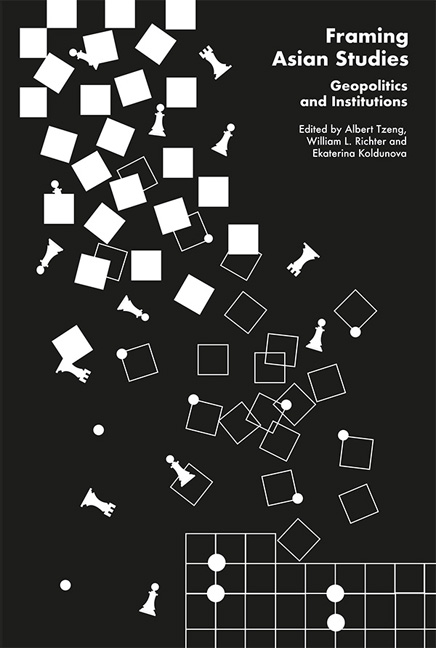Foreword
Published online by Cambridge University Press: 28 June 2018
Summary
The present edited volume, Framing Asian Studies: Geopolitics and Institutions, co-edited by Albert Tzeng, William L. Richter and Ekaterina Koldunova, derives from a conference entitled “Framing Asian Studies, Geopolitics, Institutions and Networks” that was organized by the International Institute for Asian Studies (IIAS) in collaboration with the Institute of Southeast Asian Studies (ISEAS), in Leiden, in November 2013.
Dr Albert Tzeng, the 2013/14 recipient of a joint fellowship between IIAS and ISEAS, was the main architect of the event in both its intellectual and organizational “framing”. Albert's research on the history of Sociology as an academic institutional discipline in Taiwan, Hong Kong and Singapore served as inspiration for a discussion that he, with our encouragement, wanted to broaden in its geographical reach, its intellectual and disciplinary ranges, and in its institutional and political configurations.
The IIAS–ISEAS Fellowship Programme was an innovative undertaking developed by the two institutes. The selected beneficiaries of the programme were asked to spend six months in the Dutch/ European academic setting of IIAS, and six months in the Singaporean/ Asian environment of ISEAS. The programme was unfortunately shortlived. It produced only three fellowships, with Albert as the second incumbent. He was preceded by Dr Elizabeth Chandra (2012/13), and followed by Dr Lee Yong Woo (2014/15).
Given the topic of the book, I should say something about this short-lived experiment of a joint fellowship programme and the spirit behind its creation in 2012. As we planned it with our colleagues from ISEAS, the joint fellowship aimed at reconfiguring the “area studies” paradigm — and the inherent danger of an imbalanced approach or “gaze”’ that characterizes it — to create a new mechanism in which “Eastern” and “Western” academic milieus, as agents and “ecologies” of knowledge production, are placed on equal footing so as to enable truly culturally cross-connected research projects.
When IIAS and ISEAS launched the initiative, the idea was to use Leiden and Singapore as convenient hubs in their respective regions. By interacting with peer colleagues in two different cultural and intellectual environments, the fellows tested the limits of their own research methodologies in a self-reflexive fashion generally not experienced in classical programmes.
The IIAS–ISEAS joint fellowship experiment was terminated too early to yield its potential for the development of a new model of interconnected and decentred scholarship beyond or above borders.
- Type
- Chapter
- Information
- Framing Asian StudiesGeopolitics and Institutions, pp. vii - xPublisher: ISEAS–Yusof Ishak InstitutePrint publication year: 2018



